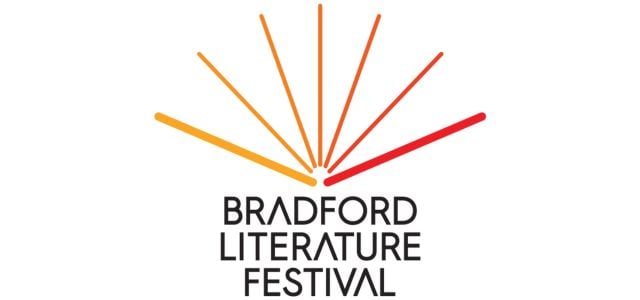Bradford Literature Festival drew to a close this weekend, having welcomed 187,366 visitors across ten days of vibrant, eclectic and thought-provoking programming, set in the heart of the newly regenerated city centre. With 752 events and 524 artists taking part, the 2025 edition reinforced the festival’s mission to challenge outdated perceptions of Bradford and celebrate its role as a dynamic, inclusive city shaping national conversations around culture, politics, and community.
Embracing themes including hope, peace, community collaboration, imagination and regional storytelling readers filled theatres and lecture halls across the city for talks and conversations. Topics ranged from memory and food to neurodivergent comedy and the miner’s strike; from the search for Atlantis and Islamic art to Bradford’s musical past and the future of Europe; as well as captivating appearances John Cooper Clarke, Ash Sarkar, Jeremy Corbyn, Reeta Chakrabarti, Lemn Sissay, Robin Ince and Steph McGovern.
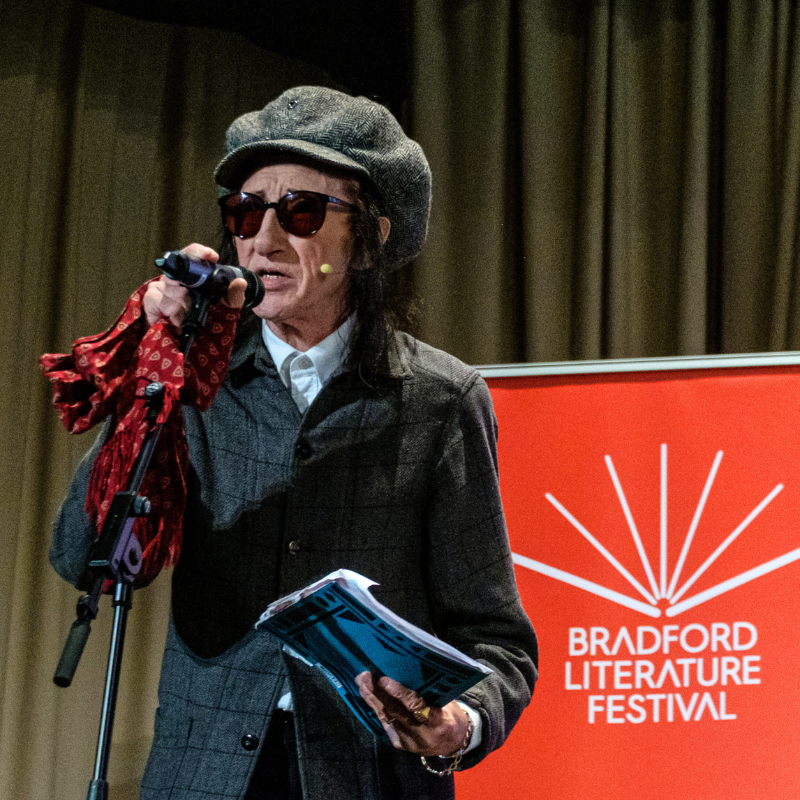
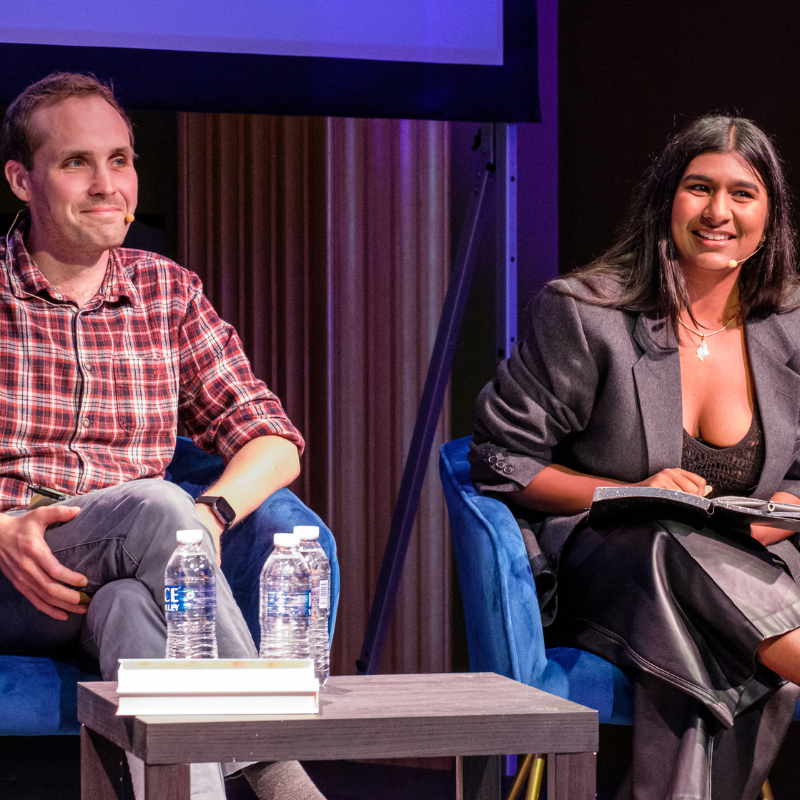
The festival opened its eleventh year with a vibrant first week of events, setting the tone for a landmark year as the city celebrates its UK City of Culture 2025 status. Highlights included beloved actors Celia Imrie, Larry Lamb, Shaykh Hamza Yusuf, and Griff Rhys Jones. Grace Dent and Nisha Katona launched the Big Tasty Read, a celebration of storytelling through food, in partnership with BBC Arts and Bradford 2025. The festival brought the city to life with an array of entertainment from the comedy night hosted by Tez Ilyas, to vibrant musical showcases like Sufiyana Kalaam, a celebration of Romani arts at Bradford Live, as well as free family activities, storytelling sessions, music, and walkabout performances. BLF also celebrated the literary legacies of city hero JB Priestley, the 100th anniversary of the Great Gatsby and 250 years since Jane Austen’s birth with dedicated events throughout the week.
Founder, CEO and Artistic Director, Syima Aslam, said: “I’m thrilled to see Bradford Literature Festival continue to grow, reaching new audiences while deepening our connection with those who return year after year. It’s been a joy to welcome such a breadth of artists and audiences from across the UK and around the world, and to see so many children and young people engage with our schools programme and free family days. From powerful, timely conversations to moments of inspiration and joy, this year has reaffirmed BLF’s role as one of the UK’s most vital cultural platforms proudly rooted in Bradford, globally connected, and open to the world.”
Drawing a packed crowd, John Cooper Clarke delivered a signature performance of his classic works, including ‘I Wanna Be Yours’, before sharing an exclusive new poem honouring a late friend—an ode to his “cryogenic crew,” in his signature hilarious and unflinching style. Speaking with Nihal Arthanayake, he explored formative moments in his life and career, recalling his early days working with Bernard Manning, the importance of idleness, and colourful encounters with figures like Chet Baker. Reflecting on mortality with humour, he remarked: “I could go to seven funerals a week, but no man can live on vol au vents alone.”
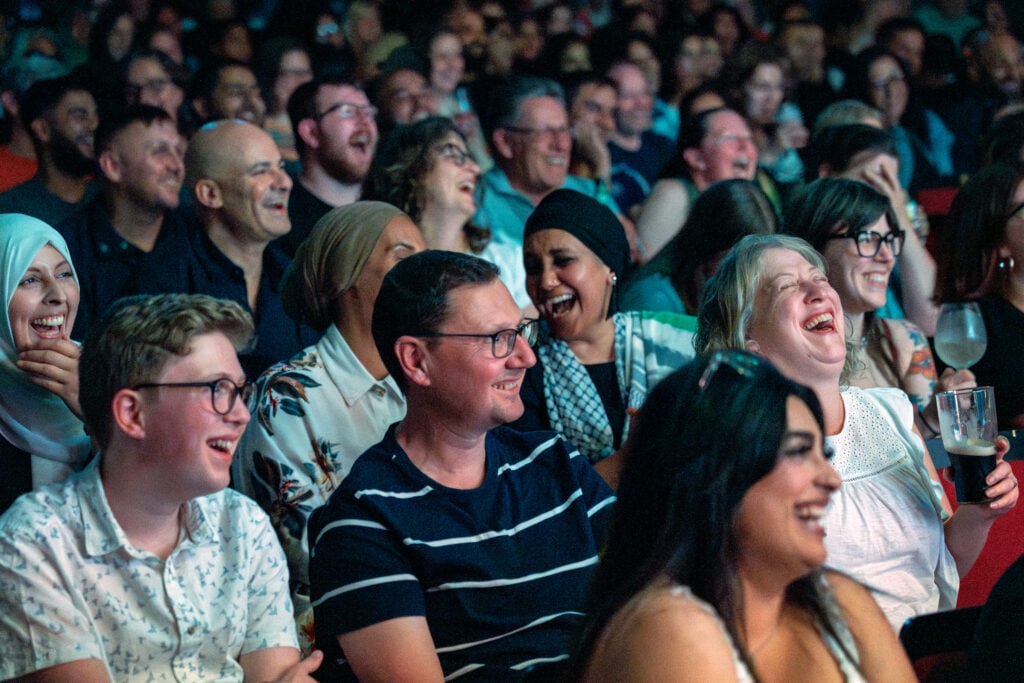
A long-term supporter of the Bradford Literature Festival, poet Lemn Sissay OBE returned to deliver the prestigious Free Word Lecture, drawing on his life in care, the politics of language, and the evolving role of love in his work: “Love is the driving force of my writing now. It is my main motivation.” In a candid conversation and separate event with Nandana Dev Sen, he also reflected on the deeply human impulse to create and connect, sharing anecdotes that ranged from poetry-induced childbirths to moments of self- discovery.
Themes of faith, empathy and reimagining futures permeated the last weekend’s events. Shaykh Abdal Hakim Murad and Dr Alexander Wain spoke with theologian Dr Brendan Wolfe about how digital access and interfaith collaboration are democratising theological study. “Faith studies are being democratised,” Shaykh Abdal noted, highlighting how access to books and ideas has shifted away from institutional gatekeeping.
Australian designer Peter Gould also offered insights into his “heart-centred” approach, rooted in empathy and faith. “We’re all creative. We all have dreams and talents and a unique combination of gifts. It’s our responsibility to use these in a beautiful way,” he said.
Bridging human-led design and the natural world, architects Anna Liu and Eelco Hooftman spoke to Peg Alexander about their approach to the future of gardening, and the essential role of urban gardens and green spaces in the fight against climate change. As practitioners exploring the ongoing legacy of London’s garden squares and international botanic gardens respectively, Liu highlighted the necessity of communities coming together and long term thinking in order to reshape these historic spaces for the benefit of our environments.
Responding to disillusionment following the many crises around the world, including conflict and climate change, further events throughout the weekend highlighted the importance of community collaboration to affect change. Ash Sarkar and Michael Chessum joined cultural historian Saeed Khan to discuss the fragmentation of the political left, the legacy of Corbynism, and the need to rebuild collective purpose.
“I’m very grateful to the Bradford Literature Festival for the space to have this sort of discussion and reach a wider audience,” said Jeremy Corbyn, opening a vital conversation with Professor Paul Rogers and Jinsella Kennaway on the global arms race and the road to peace. The panel warned of rising global tensions, escalating defence spending, and the deep entanglement between education and the arms industry. Emphasising that “things can change if enough of us are willing to stand up, be counted and spread the word,” Professor Rogers closed with a moment of hope that our current political crises are not irreversible if people come together.
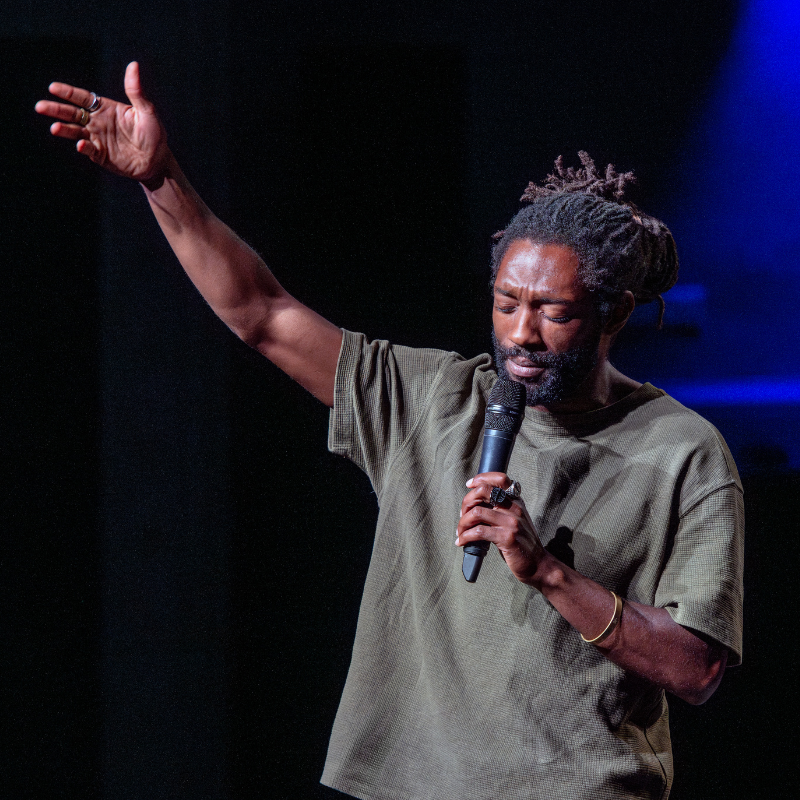
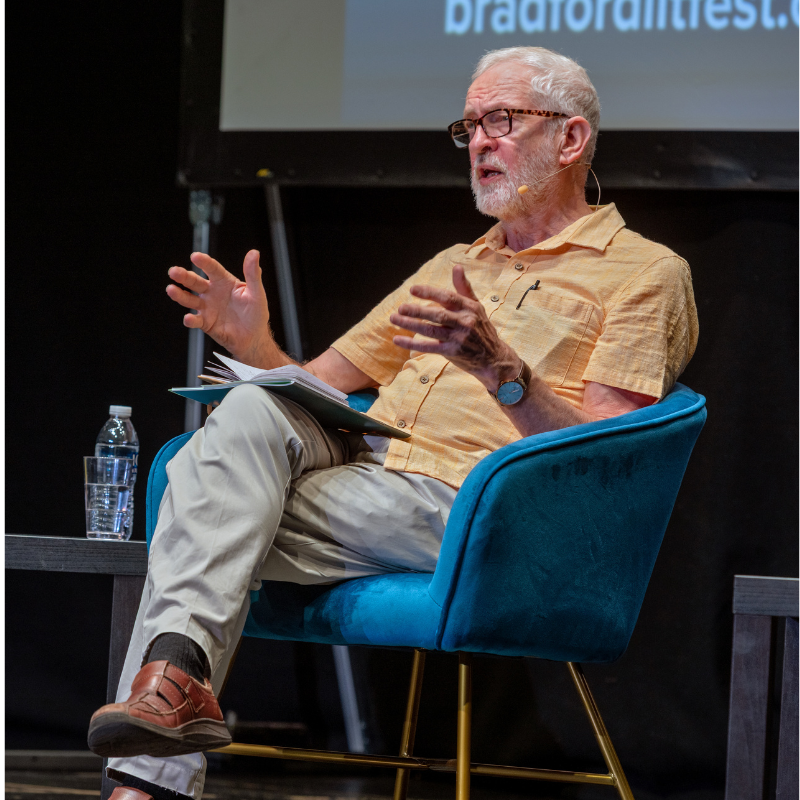
In a moving photographic exhibition, award-winning photojournalist Seamus Murphy explored 20 years of change in the West Bank city of Nablus. “One thing that gives me hope is the Palestinian people and how extraordinary they are,” Murphy reflected. “They find something to live and hope for. Most of us would’ve given up a long time ago.”
Celebrating marginalised stories and voices, Samia Rahman, Shahed Ezaydi and Sabbiyah Pervez spoke to Remona Aly about the reality of navigating the UK media as Muslim women, challenging tokenism and advocating for nuanced representation. Shahed stressed the importance of building solidarities across intersections of feminism, while the panel as a whole championed empathy, representation, and the complexity of Muslim women’s identities in public life.
The magazine WritersMosaic and The Royal Lottery Fund presented a panel of bestselling crime fiction authors, Kia Abdullah, Nadine Matheson and Saima Mir, to discuss the creative drive, personal journeys and cultural forces that shape their dark narratives. Hosted by Bradford-local John Siddique, he celebrated “the fact that we have three women from the global majority all writing incredible crime fiction on this panel today.” Abdullah and Matheson both highlighted how the literary establishment looks down on crime writing. Abdullah went on to say “Crime fiction is all encompassing. It covers mental health issues, organised religion, loss among communities. So, when the literary establishment looks down on crime fiction, it doesn’t make any sense.”
Concluding the annual Brontë programme, which captures the literary heritage of the Yorkshire area, newsreader-turned-novelist Reeta Chakrabarti shared a stage with award-winning novelist Martina Devlin for a compelling discussion on the lasting legacy of Charlotte Brontë. Reeta described her debut novel Finding Belle, as “a 21st century response to a 19th century novel,” and spoke about her enduring love for Jane Eyre, saying: “Jane Eyre is the novel I’ve read most in my life, and my relationship has changed with the characters as I’ve grown up.” Bradford’s own Irene Lofthouse brought the city’s literary history to life with her presentation about England’s first female bibliophile, Frances Mary Richardson Currer, a potential influence on the Brontës.
In his celebration of the unsung cities of the UK, travel writer Ben Aitken also pointed to the incredible history of Bradford on display through the array of fascinating buildings in the city centre. In his latest book Shitty Breaks, Ben rated the city a whopping 7.6 out of 10 – and, echoing the festival’s own ambitions, encouraged people to embrace Bradford’s cultural richness.
Doha Debates brought their globally acclaimed town hall debate format to Bradford Literature Festival once more with a special sold-out event featuring an international line-up of politicians, scholars and students to discuss the evolving role of the modern nation state in shaping personal and collective identity. Chaired by award- winning international journalist Malika Bilal, speakers included Palestinian scholar and professor at Columbia University Dr Wael B. Hallaq, Indian politician and author Dr Shashi Tharoor, and Belgian historian Dr David Engels, as well as students from the UK, Qatar and across the world, who provided commentary and profound questions to the experts’ discussion.
City Park came to life with Family Fun Days throughout the festival, offering a galaxy of free activities. During the last weekend, children blasted off on a space-themed adventure, with cosmic crafts, interstellar storytelling, and performances that lit up the park with music and movement, including joyful bhangra dancing and a bold street band. Sunday transformed the city centre into a wizarding wonderland, as families stepped into a magical realm filled with enchanting face painting, spellbinding storytelling, and walkabout characters. Highlights included special readings by authors Salma Damirji (Moon in the Room), Mario Ambrosi (Scarlett Buckling and the Case of the Missing Pictures), and Pauline Brown (Diego’s Team), as well as themed screenings of Harry Potter and the Philosopher’s Stone and Treasure Planet.
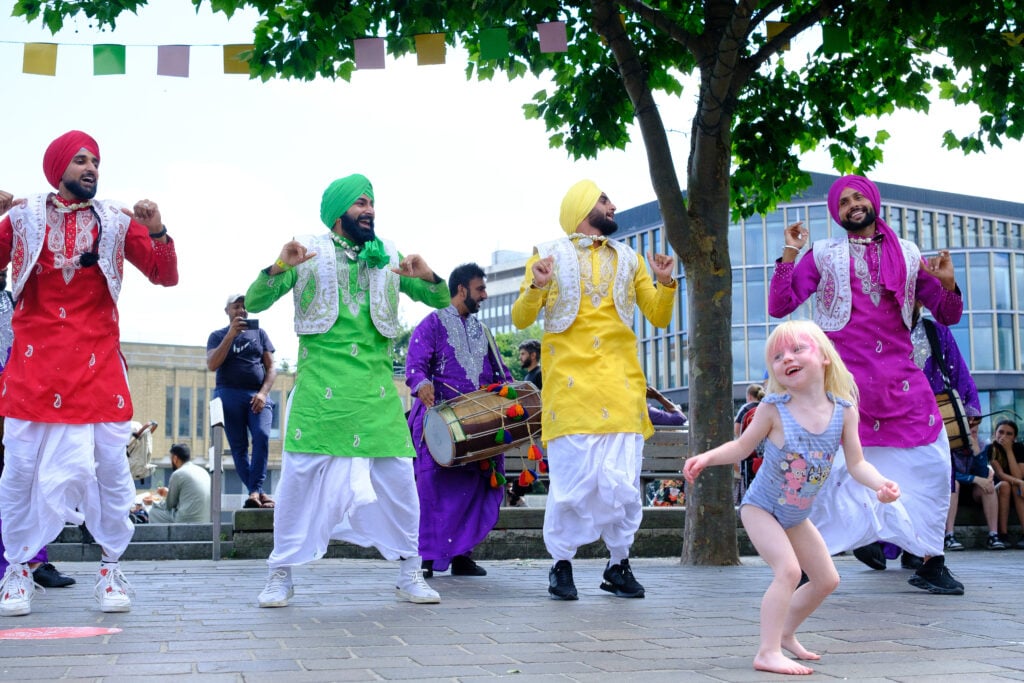
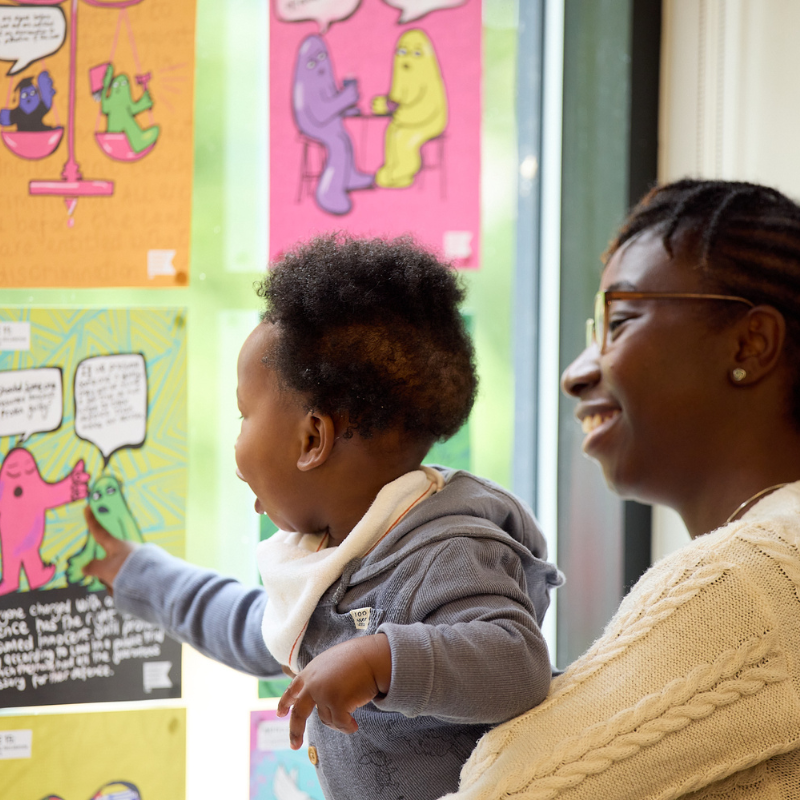
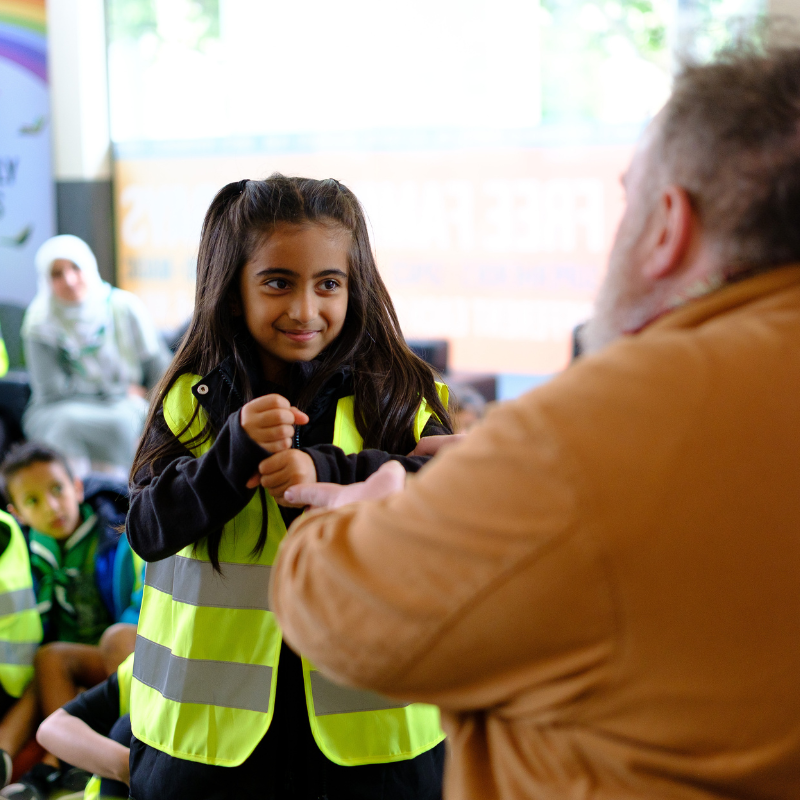
The BLF Education Programme has also been a resounding success, welcoming 31,695 children and young people across 65 immersive sessions over 13 days. Free to all non-fee paying schools, this year’s expansive programme delivered curriculum-targeted content to 69 schools – including 41 primary, 28 secondary schools and 86 home educators and home-educated learners, cementing its role as one of the UK’s most impactful and accessible cultural education offerings. This year’s programme brought together 35 acclaimed authors, performers, poets, scientists, historians and directors, including cultural historian and commentator Saeed Khan, Bradford-born author Marcia Hutchinson, and writer, rapper and world record breaking beatboxer, Testament.
Following the success of 2025, the festival has announced that it will take place between 3rd – 12th July in 2026, with further details to follow.
